Andorra. (Principality of Andorra)
Principality of Andorra
A state located in Europe, in the eastern Pyrenees between France (border length - 36.6 km) and Spain (63.7 km). Area - 468 km². Capital - Andorra la Vella (22,000 in 2003), other cities: Escaldes (15,000), Encamp (10,800), Sant Julià de Lòria (7,800). Administrative-territorial division - 7 parishes, which have certain administrative and financial autonomy. The country's constitution, paying tribute to the feudal-monarchical era from which modern Andorra originates, has preserved its historical name - Principality, which, despite the specificity of its governance, is essentially a republican state. Population - 12,500 (2003); ethnic composition: Spaniards (of whom Catalans are predominant) - 46.4%, Andorrans - 19.5%, Portuguese - 10.8%, French - 6.7%. Average life expectancy: men - 75 years, women - 82 years.
Andorra has strict immigration laws, which the authorities explain as a desire of the small nation "not to dissolve in the numerous immigrant environment and to preserve its ethnic and historical-cultural uniqueness." Andorran citizenship can be granted to individuals who have lived in the country for at least 25 years. There are various restrictions on granting temporary residence permits and work permits. The official language is Catalan, with Spanish and French also widely used. Religion - Catholic (99.1% of believers). Currency - Euro (since January 1, 2002). There are no armed forces, only small police formations (about 150 people) ensuring public order.
Diplomatic relations with the Russian Federation were established on June 13, 1995.
National holidays - September 8 (Day of Our Lady of Meritxell, patroness of Andorra) and March 14 (Constitution Day).
According to the new constitution approved in a referendum on March 14, 1993, Andorra is a parliamentary principality. The historically established co-sovereignty of Andorra since 1278 between the Bishop of Urgell (from the city of Seu d'Urgell, Spain) and the President of France has been preserved. They are the guarantors of Andorra's independence and its equal neighborly relations with Spain and France. The real powers of the co-sovereigns are limited by the constitution, participating in the preparation of international treaties concerning internal security, defense, and border issues. Currently, the co-sovereigns are Joan Enric Vives (since 2003) and Jacques Chirac (since 1995).
The legislative authority is the unicameral General Council (the oldest parliament in Europe after Iceland, functioning since 1419), which controls the government's activities and approves the state budget, elects the chairman of the parliament (syndic) and his deputy, as well as the head of government, who bears political responsibility before the parliament. It is elected by universal direct voting for 4 years (the last elections were on April 24, 2005) and consists of 28 members (14 deputies from the parishes, i.e., 2 from each, and 14 from party lists, with half of the deputies renewed every 2 years). The chairman of the General Council is F. Areny.
The government is the highest executive body, directing the internal and external policies of the country. It consists of 9 ministers. The current government, headed by A. Pintat (Liberal Party of Andorra), was sworn in in June 2005.
Main political forces: the ruling Liberal Party of Andorra (chairman - A. Pintat), the main opposition - the Social Democratic Party of Andorra (leader - X. Bartumeu), the Democratic Center of Andorra (general secretary - X. M. Cosan), Democratic Renewal (chairman - P. Garcia), the Green Party (chairman - I. Lozano). All of them adhere to centrist, moderately nationalist positions.
There is the Andorran Trade Union of Workers.
The first mentions of the territory of present-day Andorra date back to 778, when the Visigoths, under pressure from the Arabs, were forced to leave the city of Seu d'Urgell and seek refuge in the high mountain plains of the Pyrenees. Emperor Charlemagne halted the Arab advance further north and placed Andorra under the protection of the Bishop of Urgell (Spain).
In the Middle Ages, Andorra was a feudal possession mainly of the Counts of Foix and the Bishops of Urgell. In 1278, an agreement was reached between them on joint sovereignty over Andorra ("act of parage"). Subsequently, the rights of the Counts of Foix passed to the French kings. Until 1993, Andorra was officially a feudal principality under the protection of France and Spain. The co-sovereigns of Andorra (the President of France and the Bishop of Urgell) jointly appointed representatives-vicars with the powers of the head of state. The vicars had to be native residents of the principality and live on its territory. They took an oath to respect the "Fundamental Legislative Act of Andorra" (a kind of constitution adopted in 1866). In 1933, universal suffrage was introduced for men, and in 1970 - for women.
On June 1, 1993, a Treaty of Good Neighborliness and Cooperation was signed between the Kingdom of Spain, the French Republic, and the Principality of Andorra, which established its new independent status.
In 1993, Andorra was admitted to the UN, in 1994 - to the Council of Europe, UNESCO, and UNICEF, in 1996 - to the OSCE and the World Tourism Organization, and in 1997 - to the WHO. In July 1996, the country officially joined the Treaty on the Non-Proliferation of Nuclear Weapons. Currently, Andorra has diplomatic relations with 77 countries worldwide.
The GDP volume in 2004 was $1.71 billion (growth - 4.5%), inflation rate - 3.2%. 80% of budget revenues come from tourism activities, mainly skiing (over 12 million annually). An important sector of the economy is the cultivation and processing of tobacco. There are light and food industry enterprises (primarily cheese and mineral water production), as well as handicraft production of souvenirs and jewelry. The population of mountain villages engages in livestock breeding and agriculture (growing barley, rye, potatoes, and grapes). The only hydroelectric power station in the country is located in Escaldes.
There are deposits of iron, tin, marble, granite, and therapeutic thermal waters. Due to relatively low customs duties, re-export of goods brings significant income. There are 7 banks operating in the country. Only road transport is used, with a road length of 278 km. In 1983, a customs union was established with the EU.
The main foreign trade partners in the trade and economic sphere are Spain (60% of exports and 50% of imports) and France (about 25% of exports and the same amount of imports).
There is no unemployment in Andorra. The main areas of employment are: trade (25%), construction (18%), hospitality (15%), and services (12%).
Primary education is free and compulsory in all educational institutions until the age of 14. There are more than 10,000 students, and the literacy rate in the country is nearly 100%. The only higher education institution in the country is Andorran University (since 1997), where about 25% of Andorran students study (the rest abroad, mainly in Spain, France, the UK, and the USA).
Several newspapers and magazines are published (the main one being the daily newspaper "Diari d'Andorra," and the weekly "Poble d'Andorra"), there are 2 radio stations and a local TV channel "Andorra TV-Channel 33." In addition, broadcasts from Spanish and French television are received.
Read also:
How the Image of the Kyrgyz Man Has Changed
100 years/ Style/ Kyrgyzstan. Limon.KG: How the image of the Kyrgyz man has changed...
The Beautiful Country Known as Kyrgyzstan
Kyrgyzstan is a small country bordering Uzbekistan, Kazakhstan, and Russia. The main attractions...
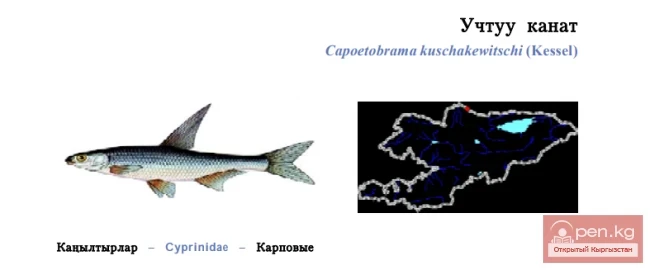
Chuya Sharp-wing / Uchtoo Kanat / Eastern Ostroluchka
Chuy Ostroluchka Status: 2 [CR: C]. Possibly already extinct in Kyrgyzstan, an endemic...
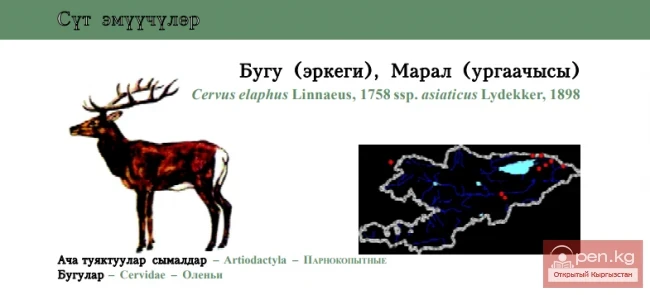
Noble Deer (Tien Shan subspecies), Maral / Bugu (male), Maral (female) / Asiatic Red Deer, Tien Shan Maral, Tien Shan stag
Noble deer (Tien Shan subspecies), Maral Status: Category IV, Endangered, EN C2a(i): R. A sharply...
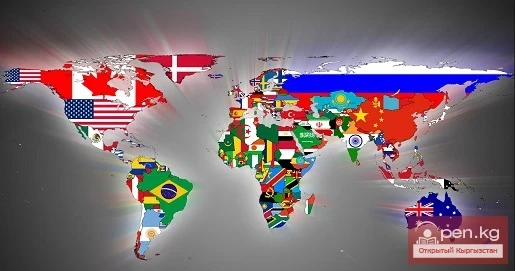
Etymology of Country Names Around the World. A-A
America. It is believed that America (and subsequently the USA) was named after the Florentine...
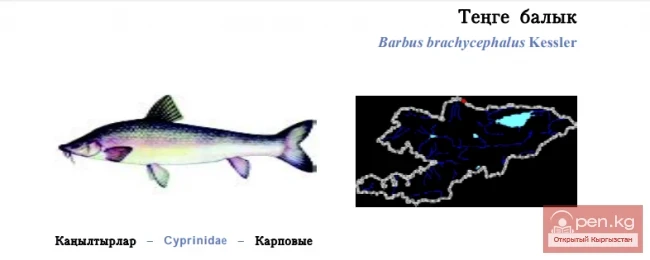
Aral Catfish / Tenge Fish / Aral Barbel
Aral Barbel Status: 2 [CR: C]. Species extinct in Kyrgyzstan....
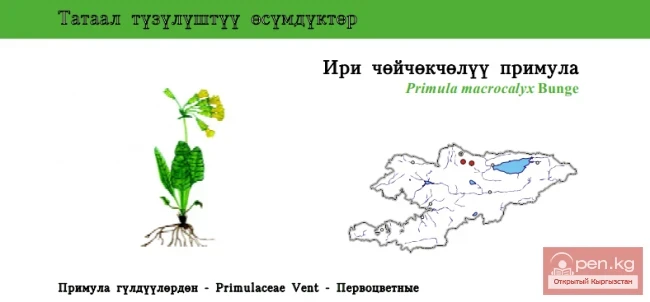
Large-calyxed Primrose
Large-calyxed Primrose Status: VU. In Kyrgyzstan, it is a very narrowly distributed, rare,...
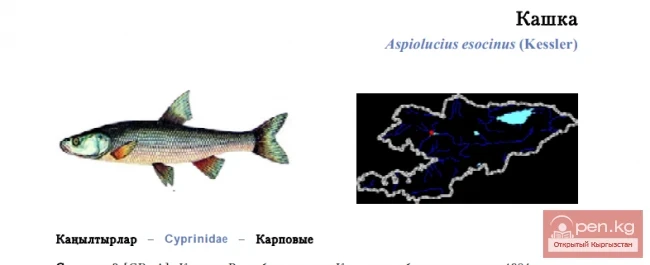
Pike Asp / Kashka / Pike Asp
Pike Asp Status: 2 [CR: A]. Listed in the Red Book of the Kyrgyz SSR in 1984. A rare...
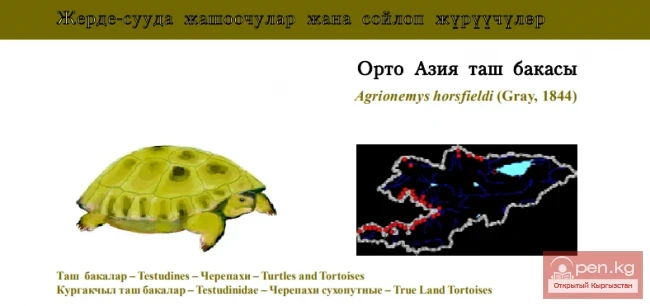
Central Asian Tortoise \ Orto Asia Tortoise / Steppe, or Afghan, Tortoise
Central Asian Tortoise Status: VU Blab (ii, iii, v); Cl. A representative of a monotypic genus,...
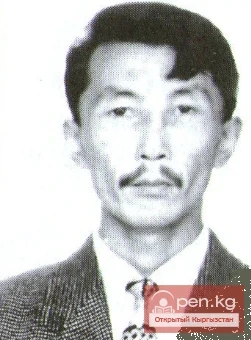
Zholbunov Nurbek Alymbekovich
Zholbunov Nurbek Alymbekovich Artist - applied artist. Born on February 23, 1969, in the city of...
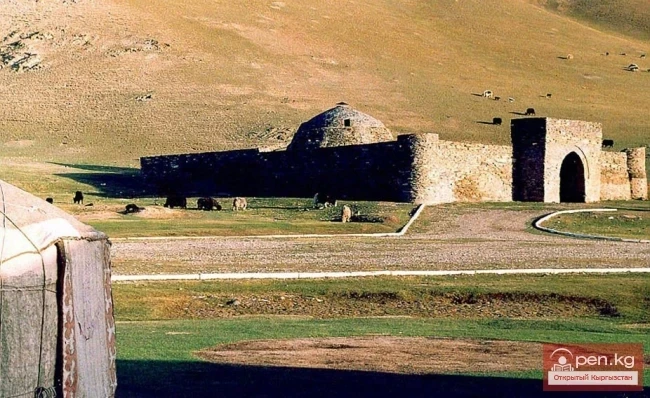
Attractions of Naryn Region
Historical-Architectural and Modern Attractions, as well as Natural-Ecological Complexes Cities...
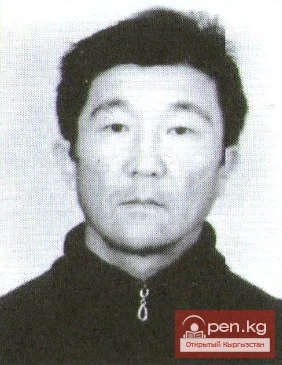
Zhaylobaev Sharipbek Mukhanovich
Zhailobayev Sharipbek Mukhanovich Theater and film artist. Born on February 18, 1960, in the city...
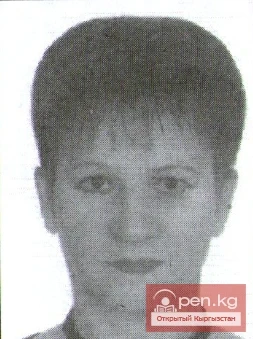
Lidia Alexandrovna Sinyavskaya
Sinyavskaya Lydia Alexandrovna Graph. Born on March 26, 1947, in the city of Frunze. In 1966, she...
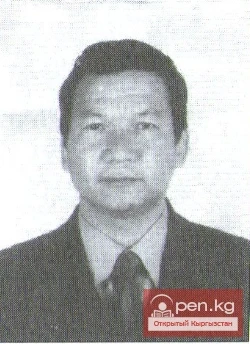
Kaimov Nurdin Kasymovich
Kaimov Nurdin Kasymovich Painter. Born on February 5, 1965, in the city of Frunze. In 1986, he...
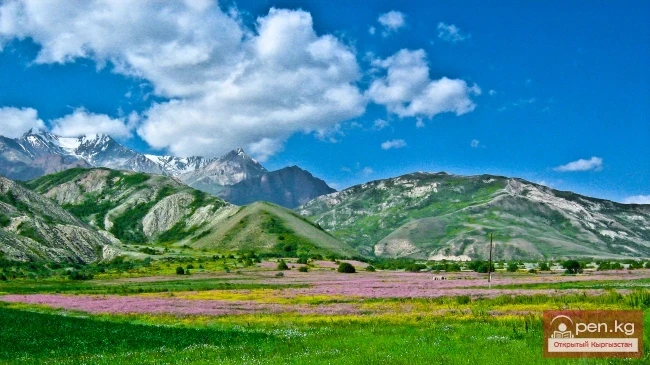
Financial Times: Kyrgyzstan Ranks Among the Top 7 Countries to Travel to in 2016
The international business newspaper Financial Times recommended its readers to visit Kyrgyzstan...
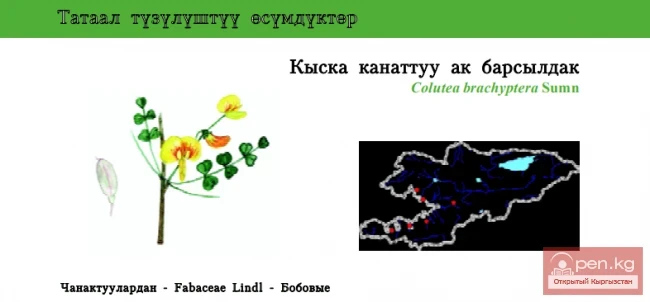
Short-winged Bladder-senna / Baibiche Chekey
Short-winged Bladder-senna Status: VU. One of three very rarely occurring species of this genus in...
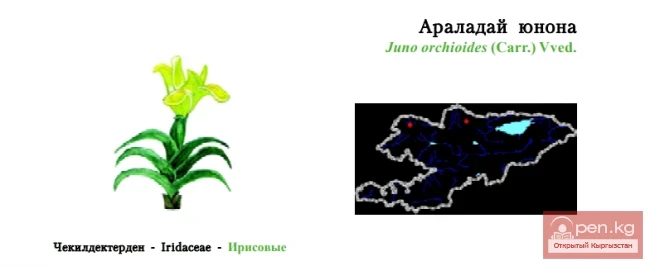
Orchid-like Juno / Araladay Juno / Juno Orchid
Orchid-like Juno Status: VU. Endemic to the Western and Northern Tien Shan....
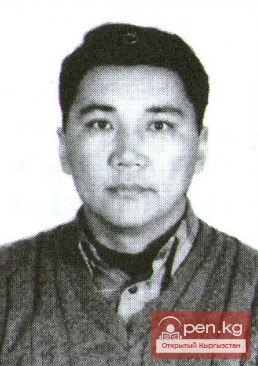
Zhanibek Kanbolotovich Berdikeev
Berdikeev Zhanibek Kanbolotovich Painter. Born on December 18, 1964, in the village of Chayek,...
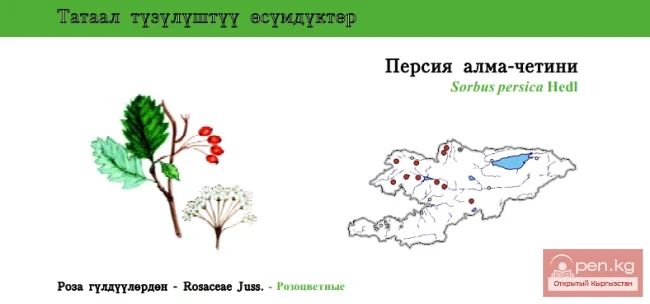
Persian Rowan \ Persia Alma-Chetini \ Persian Rowan
Persian Rowan Status: VU. Endemic, ornamental species....
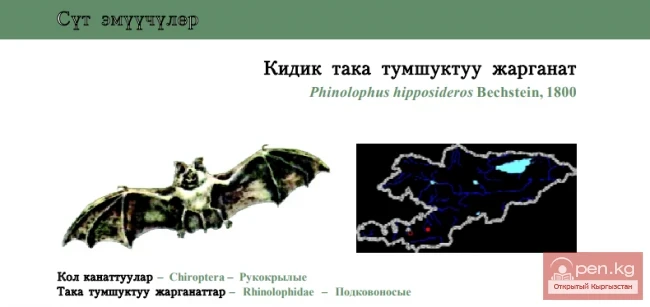
Lesser Horseshoe Bat / Kidik Taka Tumshuktyu Jarganat / Малый подковонос
Lesser Horseshoe Bat Status: Category VI, Near Threatened, NT: R. A species with a declining...
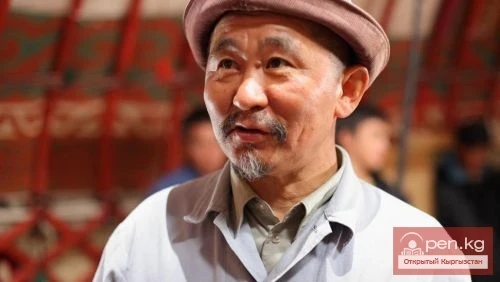
The film "Light-Ake" will be screened at the Museum of Modern Art in New York.
On April 7, the Museum of Modern Art in Manhattan, New York, will screen the film...
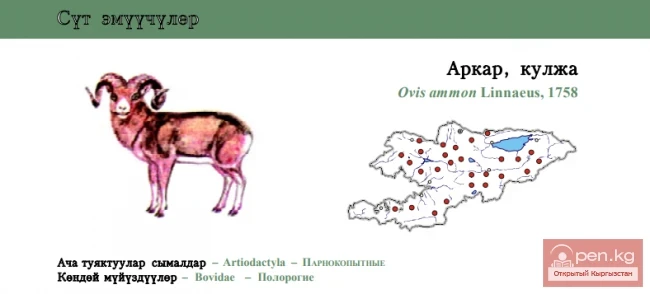
Mountain sheep / Argali, kulja / Argali
Mountain Ram Status: Three subspecies with different statuses inhabit the territory of the...
Boy dies after dog bite: Medical staff confirmed death, while parents brought him to the district hospital in hopes of a miracle
A tragic incident occurred on October 22, and an investigation is currently underway with the...
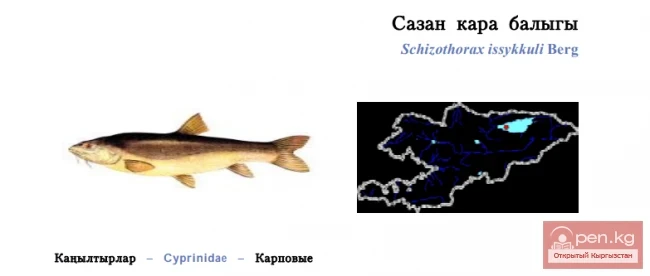
Issyk-Kul Marinka / Carp Fish / Issyk-Kul Marinka
Issyk-Kul Marinka Status: 2 [EN: D]. A rare taxon inhabiting Lake Issyk-Kul. Its...
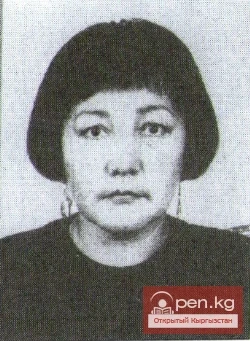
Turkmenova Atyrkul
Turkmenova Atyrkyl Applied artist. Born on September 28, 1958, in the village named after Sultan...
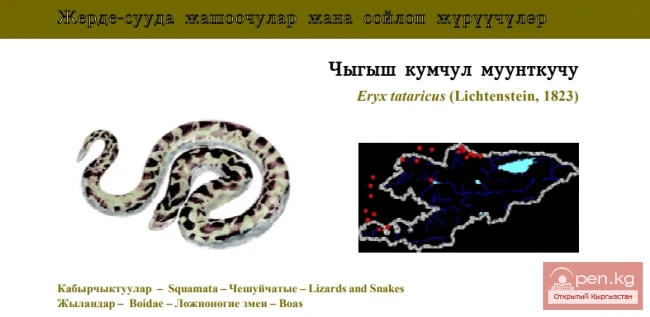
Eastern Sand Boa / Chygys Kumchul Muuntkuchu / Tatary Sand Boa
Eastern Sand Boa Status: Near Threatened (NT). One of 10 species of the genus, which includes...

New Year Events in Bishkek
Dear citizens and guests of the capital! The New Year is rushing towards us..., which means there...
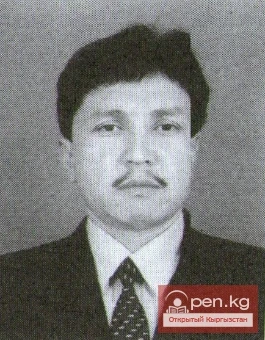
Zakirou Uluubek Anarbaevich
Zakir Uluubek Anarbaevich Painter. Born on December 25, 1971, in the Bazar-Korgon district of the...
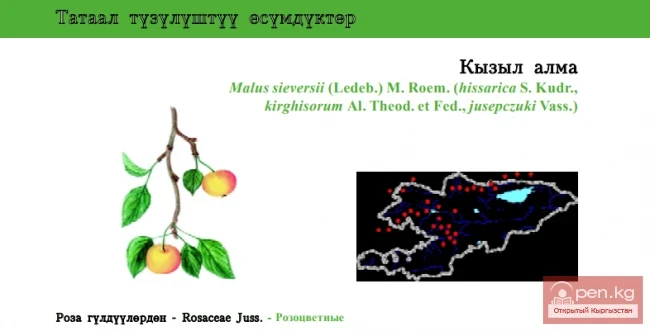
Sievers’s Apple-tree \ Kyzyl Alma \ Sievers’s Apple-tree
Sievers’s Apple-tree Status: LC category. A polymorphic species of the mountain-central Asian...
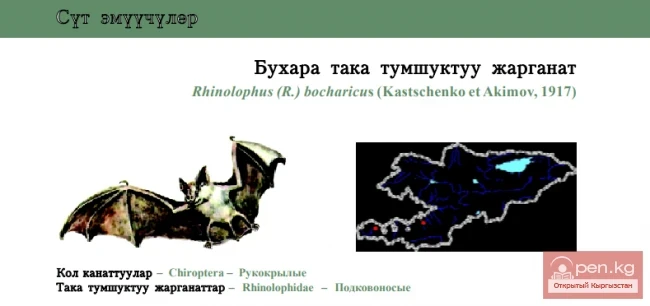
Bukhara Horseshoe Bat
Bokhara Horseshoe Bat Status: Category VI, Near Threatened, NT: R. A rare species for Kyrgyzstan,...
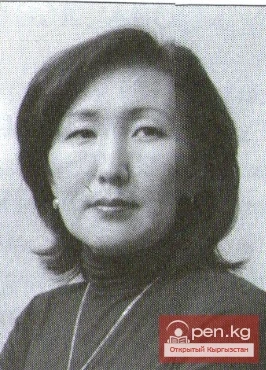
Innocentyeva Nyurguyana Nikolaevna
Inokentyeva Nyurguyana Nikolaevna Painter. Born on January 20, 1974, in Yakutsk, Republic of...

Information on the Population of Kyrgyz in the Second Half of the 19th Century
DYNAMICS OF POPULATION AND ETHNIC COMPOSITION IN THE 19TH CENTURY There are no accurate data on...
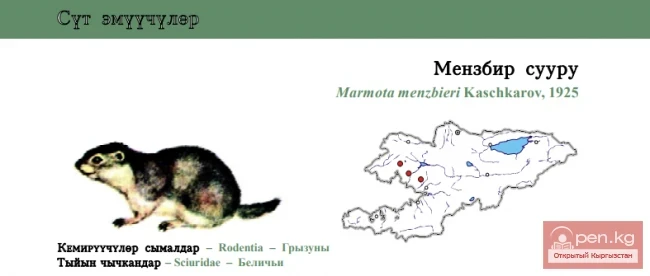
Menzbier's Marmot / Menzbir Squirrel / Menzbier's Marmot
Menzbier’s marmot Status: V category, Vulnerable, VUB1+2c. Rare species. Endemic to the Western...
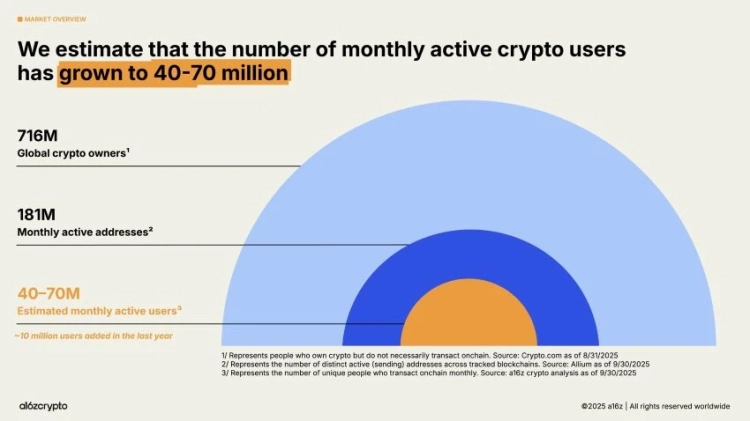
The volume of transactions with stablecoins worldwide exceeded $46 trillion in a year
According to the annual report State of Crypto 2025, prepared by the venture capital firm...
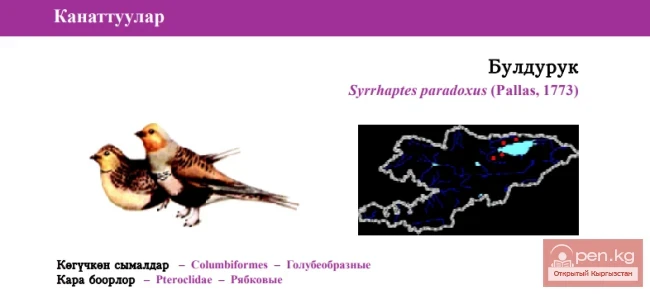
Saja / Bulduk / Pallas’s Sandgrouse
Sadzha Status: V category, Vulnerable, VU: R, Monotypic species....

Alai Bubblefish / Alai Physocline / Alai Physochlaina
Alai Bubblewort Status: VU. A rare narrowly endemic species....
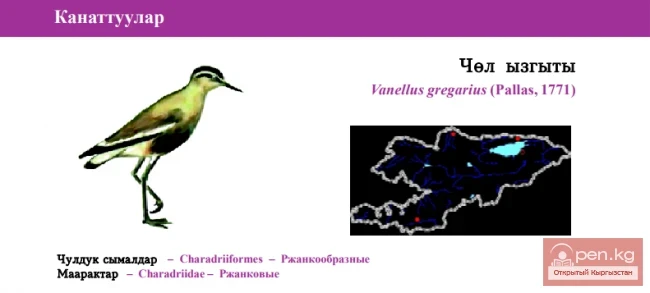
Krechetka / Cheł yzyty / Sociable Plover
Sociable Plover Status: III category, Critically Endangered, CR, A3bc. Endemic to Kazakhstan and...
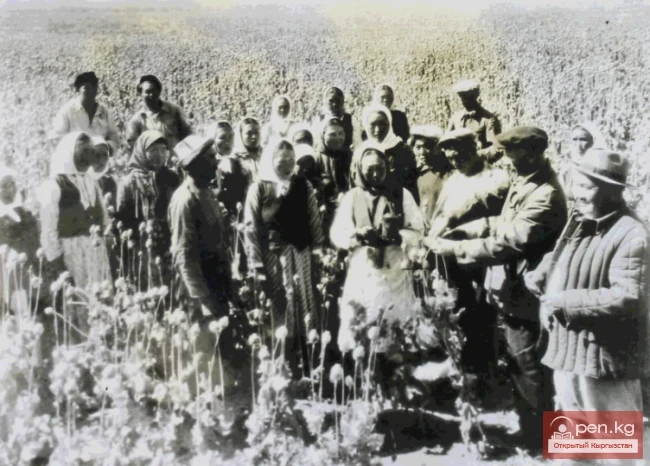
The Career Ladder of T. Dzholdoshev
After graduating from the institute, Joldoshev was assigned to the Department of Public Education...
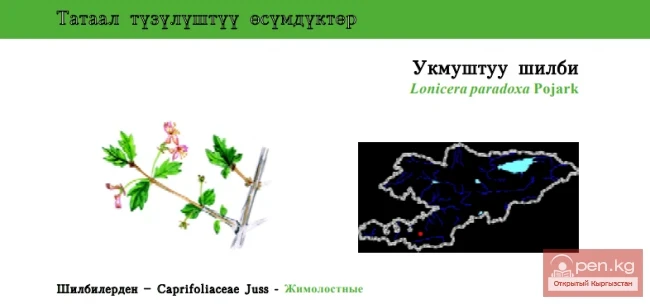
Strange (Paradoxical) Honeysuckle / Укмуштуу шилби / Paradoxical Honeysuckle
Paradoxical Honeysuckle Status: Category CR B2ab(iii). A relict endemic species with a disjunctive...
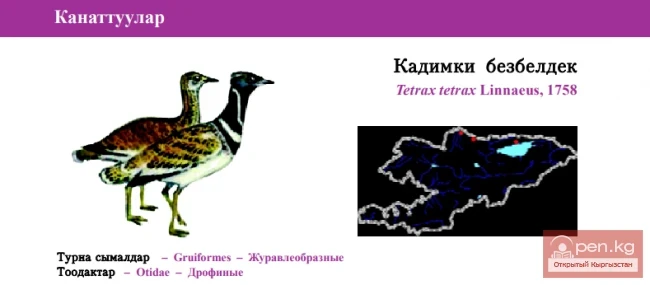
The title translates to: "Little Bustard / Kadimki bezbeldik / Striped"
Little Bustard Status: VI category, Near Threatened, NT. It has apparently not bred in Kyrgyzstan...
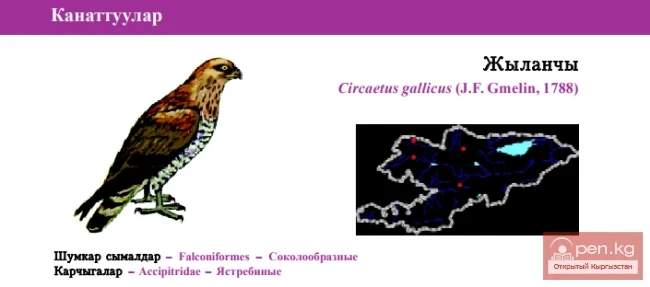
Snake Eagle \ Short-toed Eagle
Short-toed Eagle Status: V category, Vulnerable, VU: R. The only representative of the genus in...
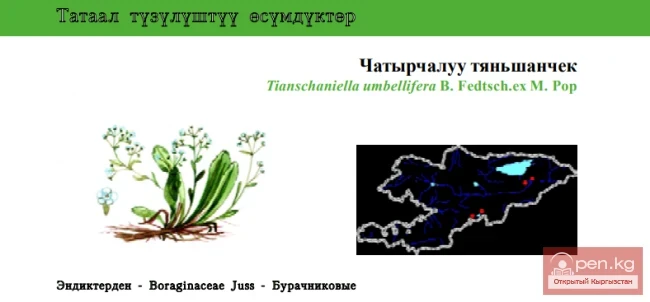
Tianshan Umbrella Bearer / Chatyr-Chal Tianshan / Tianschaniella
Tianschaniella umbellifera Status: VU. A significantly declining narrowly endemic species of...
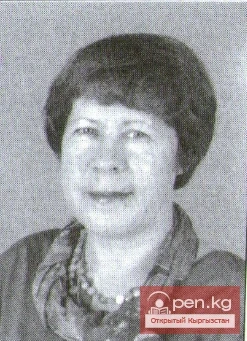
Shubina Anna Afanasyevna
Shubina Anna Afanasyevna Applied artist. Born on March 23, 1955, in the city of Frunze in a family...
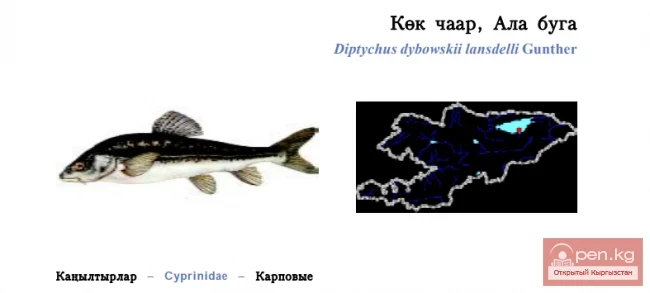
Issyk-Kul Scaleless Osman / Kök Chaar, Ala Buga
Issyk-Kul Scaleless Osman Status: 2 [CR: D]. Lake form, very rare, critically endangered....
